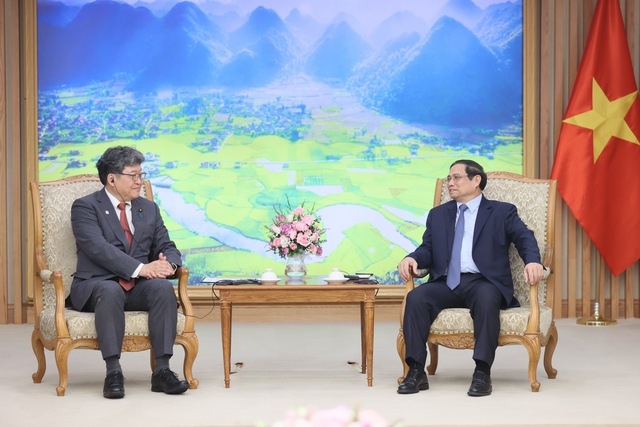Japan viewed as top important and long-term strategic partner of Vietnam
VOV.VN - Vietnam consistently regards Japan as its most important and long-term strategic partner, said Prime Minister Pham Minh Chinh at a reception held on July 10 in Hanoi for Koichi Hagiuda, chairman of the Policy Research Council of the Liberal Democratic Party, who is on a working visit to the country.

Welcoming Koichi’s fourth visit to Vietnam, the Vietnamese Government chief said he believes that the trip will contribute to strengthening the relationship that exists between the two ruling parties and the two governments.
PM Chinh therefore hailed the success of the G7 Extended Summit in May and the role of Koichi in formulating strong and effective policies of the Japanese Government during recent times, thereby helping Japan to recover and develop its economy after COVID-19.
He went on to express his hope that the Japanese official will continue to support and strongly promote mutual relations moving forward.
This year marks the 50th anniversary of joint diplomatic ties, PM Chinh told his guest, adding that over the past five decades, mutual relations have developed in a strong, comprehensive, and substantive manner worldwide across multiple fields with high political confidence.
Japan is currently the country’s leading economic partner, the first in ODA, the second in labour co-operation, the third in investment and tourism, and the fourth in trade.
PM Chinh stated that he wishes that Hagiuda Koichi will continue to pay attention to and contribute to developing the extensive strategic partnership substantively and effectively in a variety of fields, in line with the aspirations of the two countries and two peoples for the sake of peace, co-operation, and development in the region and the world.
He outlined his hopes that the Far East nation would continue to support Vietnam in industrialization, modernization, independence, economic self-reliance, and deep international integration, with the ultimate goal of being a developing country with a modern industry and high middle income by 2030, as well as becoming a developed, high-income country by 2045.
Most notably, Japan will provide new generation ODA for the Vietnamese side to develop infrastructure and train human resources, with these things being two of the three strategic breakthroughs that Vietnam is in the process of making.
The country therefore backs Japan's role in the international arena, PM Chinh said, while asking the Japanese side to support the nation in implementing programmes and initiatives proposed by Japan, regarding digital transformation, green growth, circular economy, and sharing economy.
For his part, the Japanese official highly agreed upon with PM Chinh's comments, affirming Japan's desire to continue taking the extensive strategic partnership to new heights.
The East Asian nation will therefore support Vietnamese enterprises to join the global supply chain, promote Japanese enterprises to continue to expand investment in the Vietnamese market, implement ODA provision commitments for the country, and help the nation in human resource training, including expanding the acceptance of interns.
Japan will also support the Vietnamese side in digital transformation, green transformation, and achieving the goal of reducing net emissions to zero by 2050, he said, going on to suggest that Vietnam continue to create more favourable conditions for Japanese enterprises to invest and conduct business in the country.
Japan - ASEAN relations are in the process of making good progress, the Japanese official said, while expressing hope that Vietnam will participate and play a higher role in Japan - ASEAN relations. In the immediate future, Japan wishes for Vietnam to support and actively participate in the upcoming Japan-ASEAN special summit, he added.
At the meeting, the two sides also compared notes on a number of regional and international issues of mutual concern. In which, they voiced support for the stance of Vietnam and ASEAN regarding the East Sea issue.
They underscored the importance of maintaining freedom and safety of navigation and aviation, peacefully settling disputes on the basis of international law, fully implementing the Conduct of Parties in the East Sea (DOC) towards a substantial and effective Code of Conduct in the East Sea (COC) in accordance with international law, including the 1982 UN Convention on the Law of the Sea (UNCLOS).
